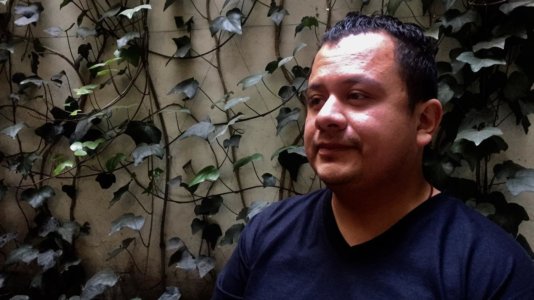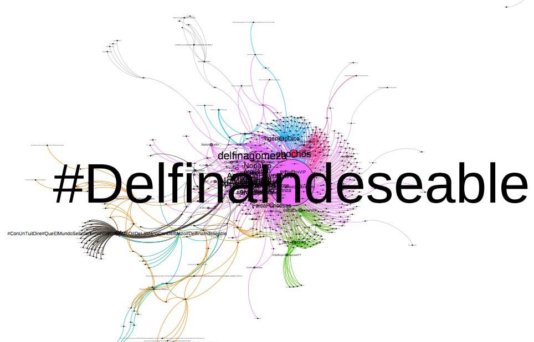- About
- Topics
- Picks
- Audio
- Story
- In-Depth
- Opinion
- News
- Donate
-
Signup for our newsletterOur Editors' Best Picks.Send
Read, Debate: Engage.
| May 02, 2018 | |
|---|---|
| topic: | Freedom of Expression |
| tags: | #Arab Spring, #Alberto Escorcia, #social networks |
| located: | Mexico |
| by: | Pablo Pérez Álvarez |
For this, he has received numerous threats that have forced him to leave his country three times and be granted with some security measures provided by the authorities to journalists.
FairPlanet: How did a graphic designer like you ended up being a political blogger and activist in the social networks?
Alberto Escorcia: I used to write about tech issues but at some point, I realised that I couldn’t keep talking about the last iPhone anymore and I had to do my bit for society. I began to write about these things in 2009. That year there was a swine flu outbreak in Mexico. The government said that there were a lot of dead people and that is was much worse than actually was, so we were everybody literally enclosed at our homes. Besides, they insisted on saying that the origin of the disease was the United States, but a journalist found out that it actually came from Mexican farms. Then, I and many others helped to spread the non-official version. That was the first bloggers’ movement in Mexico, the first information uprising using social networks.
How often has this kind of movement arisen in the last few years in Mexico?
This has been a continuous phenomenon: the media replicate the official version of a story and later tweeters, YouTubers, bloggers… give the alternative one.
When did you begin to detect the use of bots to manipulate the public opinion with political purposes in your country?
Also in 2009, there was an important labour conflict because of the closure of the biggest electricity company in Mexico. The workers protested against it and there emerged the first bots, to silence them. I began to write about politics in the social networks, with my blog. But it was in the 2012 general election in Mexico when I found out that there was a huge operation using a particular application by people close to Enrique Peña Nieto (the future president) and the conservative candidate Josefina Vázquez to program thousands of tweets in order to generate in a short time trending topics with bots completely automated.
How did you know they used bots?
I spotted them during the electoral campaign because identical messages were being spread massively, but I only could prove it scientifically in 2013, when I learned how to use a software that analyses networks. Bots tweet at the same time and do it from the same place or at the same speed. It’s different to the chaotic human behaviour. Real people write at different times, reply to each other, discuss among them… To sum up, we generate nets looking like the roots of a tree and bots generate square, circular or triangular shapes. That’s how you can distinguish them.
Why did you and other bloggers decide to expose this practice?
If the law would force them to label bot’s messages indicating: “This is a sponsored message”, there would not be any problem. But what they do it to pretend that they have a popular support and that’s criminal because they’re manipulating the public opinion. They’re playing with people’s perceptions. Besides, I’ve documented up to 75,000 social networks accounts in one single operation and that involves a lot of money whose origin is not transparent.
Have bots been used in Mexican politics only for self-promotion?
At first, they were used to promote the candidates, to falsify massive support, and also to strike the adversaries. But later, in 2012 general elections they start to use them to attack activists.
When did the threats against you begin?
They began in December 2012. After Peña Nieto’s victory, there was a big protest the day of his investiture a violent repression, with one dead and a lot of injured people. That day I was threatened by bots via Twitter and I was warned that a local authority wanted to arrest me. I had to leave the city for almost a month. At the same time, a magazine published an article slandering me. It said that I was responsible for the violence the day of the protest. But I had nothing to do with it. Later, in 2013, when I began to formally document the peñabots (bots pro Peña Nieto) I received more threats from Twitter accounts.
How are these attacks?
There are three types of them. The first one consists of hundreds of accounts threatening an activist via Twitter. The mention him or her and, later, another big group amplifies it. The effect is that the victim’s mobile phone beeps hundreds and hundreds of times. That produces a horrible psychological effect. Many of the victims I know have ended up in the hospital some time with a nervous breakdown. They receive images of dead people, corpses or their names with bullets and messages saying they are going to be killed.
The second type is the publication of articles in some media indicating that these people are criminals reinforced with the generations of trending topics spreading that article.
The third form is the cloning of your social networks accounts and the publication on them of pictures of you that they get in Facebook or taken with espionage methods, the defamation or the creation of a damaging story about you. They have destroyed many’s professional careers this way.
Did you take the death threats seriously?
There are many killings of journalists here in Mexico (12 last year, 105 since 2000 according to Article 19). But the bloggers have the added problem that we’re not formally journalists and are not taken seriously. If you compare a threat via Twitter to a threat from a drug dealer to a journalist, ours seems less important, but around 20 tweeters have been killed in our country in the last eight years after this kind of threats. They are not in the NGO’s lists. They are in limbo as they are not journalists but informer citizens.
Did any of these threats go further the social networks?
They have tried to force my door several times and once somebody broke into my house and stole a hard drive with sensitive information of some of my investigations. But there’s been mainly an harassment, like waking me up in the dawn ringing my bell. I’ve even had to move home.
How have the threats affected your life?
It’s been very hard. This can affect you psychologically, because you don’t know if they are really going to kill you or it’s something just virtual, and many things pass through your mind. And ultimately this becomes something chronic. I’ve been diagnosed with post-traumatic stress in 2016 because I cannot sleep. I have very poor health, I cannot concentrate. I’m very afraid. Besides, my personal networks are broken. My friends, my family have got away from me because of fear. I’ve lost jobs, nobody wants to hire me…
Have you been forced to leave Mexico?
It’s been three times already. First was in 2016. Until then, I used to publish under a pseudonym, but that year I gave an interview with my real name to a United States magazine called Wire. Two weeks later I got hundreds and hundreds of death threats with photos of mine and many personal data. Before that, the threats were addressed to my Twitter account, but not to Alberto Escorcia. Barcelona Council got me out of Mexico and took me there three months as a refugee. The second one was in January 2017, just after my return from Spain. At that moment there was a huge rise in the petrol prices in Mexico and people made protests spontaneously. But there was also a campaign with thousands of bots encouraging people to loot stores and there were serious riots in my neighbourhood in the north of Mexico City. I found out that there were some anomalies in the tweets prompting the loots with the use of bots. I reported it and all the media published it. The threats began again and one of these false accounts published my name, my address and my phone number offering a $10,000 reward for a picture of my killing. NGO Front Line Defenders took me out to Costa Rica for a month. And the last time was last December. I went to Costa Rica again because of some threats.
The manipulation techniques you denounced have evolved?
That behaviour has been usual in political groups in Mexico since 2012, but they don’t use bots anymore. That ended in 2014 because nowadays is very easy to detect. We still call it bots, but they are actually trolls, people working in a coordinated way to generate trending topics.
How are the new methods to manipulate public opinion through social networks?
Every day there are five or six trending topics generated by trolls mainly promoting commercial brands, but at least one or two boosting some politician. Now it’ so cheap that even small-time politicians can hire these services. They used to charge around $2,500 to create a trending topic for each person working on it and they needed from 100 to 150 people. It was a million-dollar industry. But nowadays they are paid even with iTunes or Spotify gift cards and around $1,000 to the leader. Costs have plunged down and clients base have expanded. So, it’s very common.
Social networks emerged as a tool to democratise the information, but it seems that they have been turned down and have become a tool for manipulation.
It’s very sad. They have became a nemesis of alternative communication. The Internet has become a monster. It used to be a nice tool to communicate –Arab Spring, the 15M in Spain, the changes in the world…- but at the same time, it became a nightmare. I think we must redesign Internet. I don’t know what’s the remedy. At least in Mexico, it’s already normalised. It’s a social problem, not only a technological one.



By copying the embed code below, you agree to adhere to our republishing guidelines.
